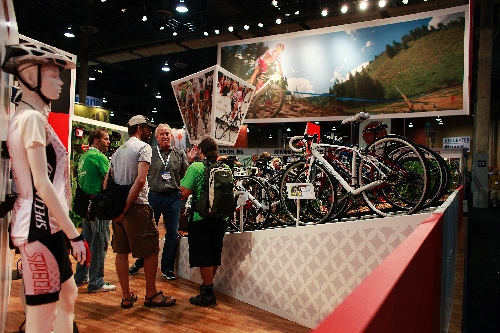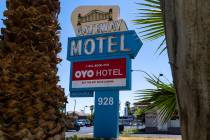Electricity gives bicycles whole new spin
Jim Thomas looked as if he was riding a bicycle in the Sands Expo and Convention Center on Wednesday, but a 500-watt motor inside an electric-powered bike trailer connected to the two-wheeler was actually propelling the electric-bike shop employee from Philadelphia.
Thomas was testing the Ridekick Power Trailer, and he liked what he saw.
"It pushed me straight and smooth," said Thomas, 61, who works at the Philly Electric Wheels retail store and was among the thousands of participants in the bicycle industry's 30th annual Interbike trade show that ends today .
Interbike set aside more space than ever for electric bike demonstrations in recognition of the growing interest in "e-bikes" in the U.S.
While there is always some tension between e-bike makers and the traditional human-powered bicycle retailers, the e-bike category is gaining steam. Even retail bicycle powerhouses such as Trek sell the product as Americans seek transportation alternatives amid high gasoline prices and as the bicycling population ages.
"There had been some resistance, but we've been noticing more interest from the retailer," said Rich Kelly, Interbike communications director.
Ed Benjamin, of Fort Myers, Fla., chairman of the e-bike trade group Light Electric Vehicle Association and a former bike shop owner and racer, said his "educated guess" is that 200,000 e-bikes will be sold this year.
There are 35 e-bike exhibitors out of 1,200 showing at Interbike this year, said Sid Kuropchak, Light Electric vehicle Association executive director.
E-bike prices range from about $600 to $2,500, with the top-of-the-line models costing $8,000, Kuropchak said. By comparison, a traditional pedal-powered bike retails from $200 with a bike made for regular road rides starting at about $600.
Benjamin acknowledged a "visceral reaction" -- meaning negative reaction -- to e-bikes by hard-core bicycle purists. But e-bike advocates say their customers can use the product even if they're physically disabled.
For example, e-bike retailer Mike Majors said customers with maladies such as multiple sclerosis can use e-bikes when they cannot ride a human-powered bicycle.
E-bike retailers also sell kits that can retrofit conventional bicycles as e-bikes. China-based Noconia Motor sells those kits for $400, and a lithium battery costs $300 to $600, said Jan Wright, a Niconia Motor sales manager.
In the U.S., e-bikes are not supposed to exceed 20 mph. An e-bike traveling at 12 mph should have a range of 30 to 50 miles, Wright said.
E-bikes come in two types -- ones that has a throttle like a motorcycle and ones that are assisted by the user's pedaling motion, Kuropchak said.
The Ridekick Power Trailer that Jim Thomas was trying out Wednesday has a 500-watt motor and retails for $699, said Chelsey Walker, a Ridekick marketing specialist. She called it the first commercial bike trailer of that type on the market.
The bicycle industry generated
$6 billion in sales in 2010, according to the National Bicycle Dealers Association. Benjamin, the Light Electric Vehicle Association chairman, said his group is still working on collecting e-bike sales data.
Bicycle retailer Jerry Hiniker, who owns a bike shop in Grand Marie, Minn., and is a National Bicycle Dealers Association board member, said his shop has "dabbled" in e-bikes and noted an "aging population will be a real target" for the e-bike.
Though not everyone in the bicycle industry may like e-bikes, Kuropchak said all retailers play on the same team.
"We both have the same goals," Kuropchak said. "And that's get people on bikes."





























